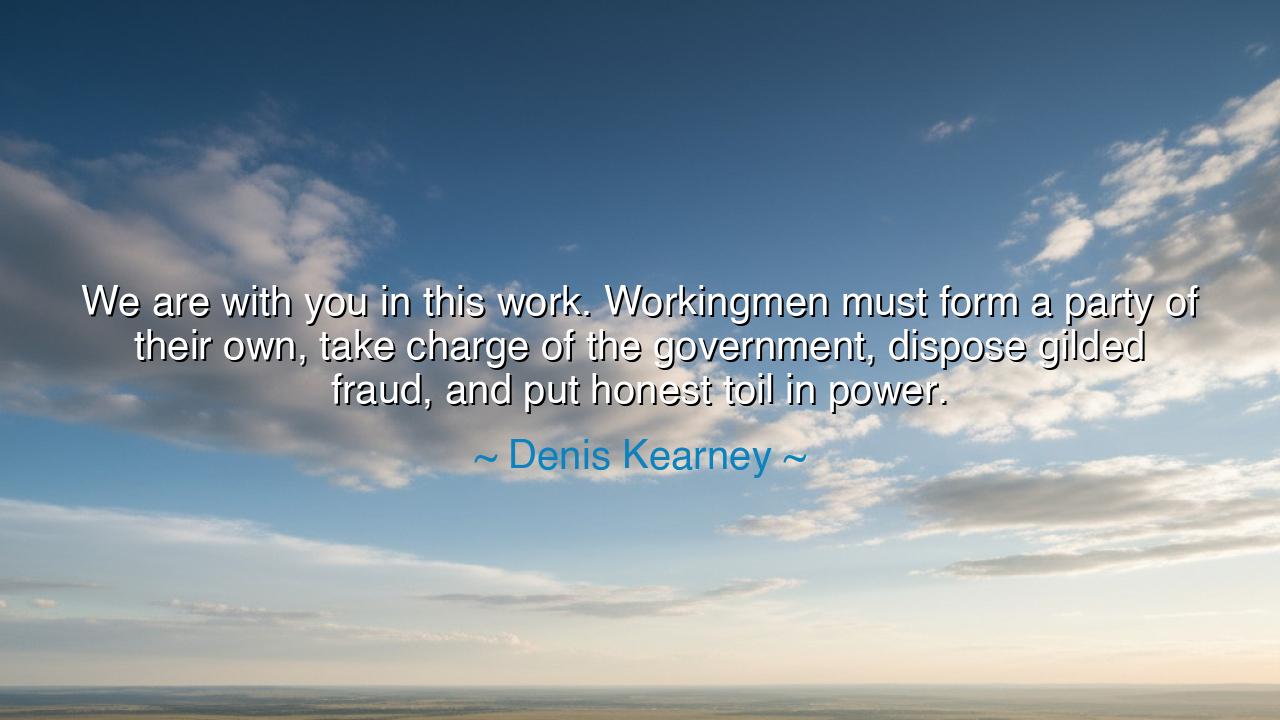
We are with you in this work. Workingmen must form a party of
We are with you in this work. Workingmen must form a party of their own, take charge of the government, dispose gilded fraud, and put honest toil in power.






“We are with you in this work. Workingmen must form a party of their own, take charge of the government, dispose gilded fraud, and put honest toil in power.” Thus thundered Denis Kearney, a fiery voice of the 19th century, who rose from the dust and din of labor to proclaim a gospel of justice for the working man. His words blaze with the passion of those who toil with calloused hands and weary hearts, yet dream of a nation where labor itself holds the reins of destiny. To dispose gilded fraud — to cast down the false splendor of corruption — and to put honest toil in power — this was not a call to envy, but to righteousness. Kearney spoke for those forgotten by privilege, and his cry still echoes wherever the humble seek dignity before the proud.
In his time, America was gripped by great upheaval. The late 1800s saw the birth of mighty industries — railroads, steel, and factories that stretched like iron cathedrals across the land. Yet beneath this progress lay pain: the workingmen, who built the wealth of the nation, lived in poverty and peril. The rich grew gilded, not with honor, but with greed; they wielded power not for the good of all, but for the gain of a few. It was in this age — the Gilded Age, as it was later called — that Kearney, an Irish immigrant and drayman of San Francisco, raised his voice against injustice. His words burned with anger, yes, but also with conviction — the conviction that labor, not gold, was the true foundation of the Republic.
When he said that the workingmen “must form a party of their own,” he spoke to the ancient truth that every people must guard their own freedom. The ruling powers of his day — the wealthy elite, the politicians in their pockets — did not represent the worker’s heart. Kearney urged that the common laborer must cease to be the pawn of others and become the master of his own fate. He envisioned not rebellion for its own sake, but self-governance born of toil, where the sweat of the brow would command the same respect as the pen or the coin. To take charge of government was not to destroy it, but to restore it — to cleanse it of the corruption that had soiled the promises of democracy.
His demand to “dispose gilded fraud” rings as a moral commandment — a call to cast off the illusion that wealth equals virtue. In Kearney’s age, corruption wore fine clothes and spoke in smooth tongues, but its heart was hollow. Factories crushed men’s bodies, and monopolies crushed their spirits. He called these powers “gilded fraud” because their beauty was a lie: gold on the outside, decay within. Against this, he set the purity of “honest toil” — the simple nobility of those who worked with integrity, producing with their hands and hearts what no machine could imitate: human effort and human honor.
In this, Kearney’s words join the long chorus of labor’s struggle — from the peasants of ancient lands to the factory workers of the industrial age. His vision found echoes in the movements that followed: the Knights of Labor, who sought equality between worker and employer; the Populists, who fought for farmers and small tradesmen; and later, the New Deal reforms, which sought to bring dignity back to labor’s name. Through each era, the same truth resounded — that a nation’s greatness does not lie in its palaces or profits, but in the hands that build, the hearts that strive, and the will of the people to rise together.
Yet Kearney’s passion, though righteous, also burned with danger. Like many revolutionaries, his fury at injustice sometimes veered toward prejudice — particularly against Chinese immigrant laborers, whom he wrongly blamed for the workers’ plight. Here lies the paradox of human struggle: that even the noble cause can be marred by the blindness of hate. History teaches that to lift one group by trampling another is to corrupt the very justice one seeks. Thus, his life stands as both inspiration and warning — a reminder that the battle for dignity must be fought not only against the oppressor, but also against the hatred that tempts the oppressed.
From his words, we may draw this enduring lesson: power must be earned by service, and justice must be guided by compassion. The true “party of the workingmen” is not one of anger or division, but of unity — where all who labor, in field or factory, with hand or mind, share in the fruits of their nation. To take charge of government means not to conquer it for oneself, but to restore it for all. And to “put honest toil in power” means to honor effort above ease, integrity above wealth, and community above greed.
So, O listener, remember Kearney’s cry — not as a call to rage, but as a call to awaken. Whatever your station, labor with honesty, speak for the voiceless, and guard your nation’s fairness as fiercely as your own life. For when honest toil rules the land, corruption withers, and the golden promise of democracy shines once more — not gilded, but pure. The hands that build must never again be ruled by the hands that only take.






AAdministratorAdministrator
Welcome, honored guests. Please leave a comment, we will respond soon